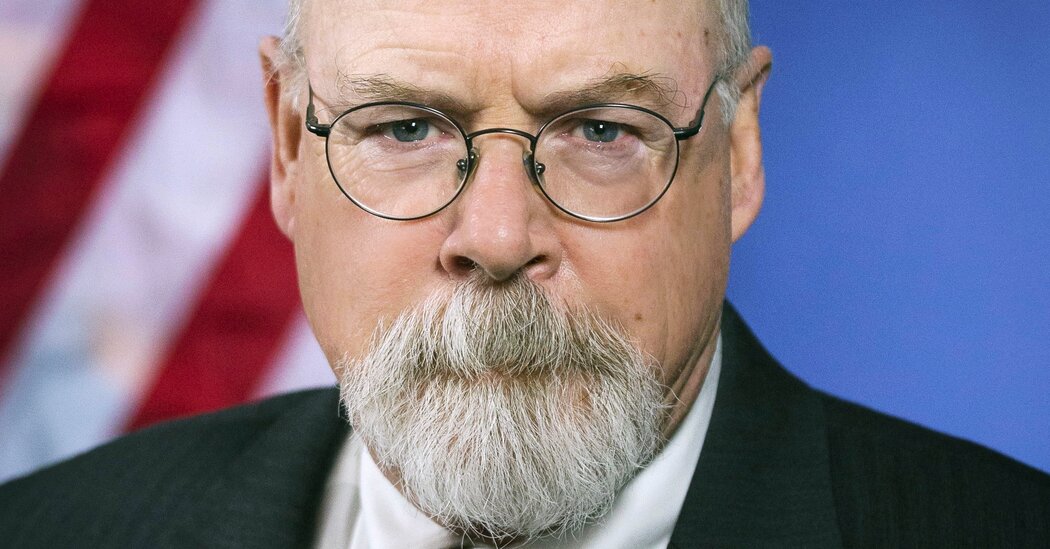WASHINGTON — A prominent cybersecurity lawyer was indicted on a charge of lying to the F.B.I. five years ago during a meeting about Donald J. Trump
WASHINGTON — A prominent cybersecurity lawyer was indicted on a charge of lying to the F.B.I. five years ago during a meeting about Donald J. Trump and Russia, the Justice Department announced on Thursday.
The indictment of the lawyer, Michael E. Sussmann, had been expected. Mr. Sussmann — of the law firm Perkins Coie, which has deep ties to the Democratic Party — is accused of making a false statement about his client at the meeting.
Mr. Sussmann’s defense lawyers have denied the accusation, saying that he did not make a false statement, that the evidence he did is weak and that who he was representing was not a material fact in any case. They have vowed to fight any charge in court.
The charge centers on a Sept. 19, 2016, meeting with an F.B.I. official in which Mr. Sussmann relayed concerns by cybersecurity researchers who believed that unusual internet data might be evidence of a covert communications channel between computer servers associated with the Trump Organization and with Alfa Bank, a Kremlin-linked Russian financial institution.
The F.B.I. looked into the concerns about Alfa Bank but dismissed them. The special counsel who later took over the Russia investigation, Robert S. Mueller III, ignored the matter in his final report.
According to people familiar with the case, the F.B.I. official whom Mr. Sussmann met with, James A. Baker, who was then the bureau’s top lawyer, recalled that Mr. Sussmann told him he was not there on behalf of any client. Prosecutors contend this was a false statement; Mr. Sussmann’s legal team denies that he said that.
Mr. Sussmann has testified separately that he was representing a cybersecurity expert who had helped examine the odd internet data and who wanted to remain anonymous.
Additionally, internal law firm billing records obtained by Mr. Durham are said to show that when Mr. Sussmann had done some work on the Alfa Bank matter, he logged it as time to the Hillary Clinton campaign. (A colleague of Mr. Sussmann’s, Marc Elias, was the general counsel to the Clinton campaign.)
In addition to saying that Mr. Baker’s memory is inaccurate, Mr. Sussmann’s legal team has said that his client was the cybersecurity researcher and that the billing records are misleading.
A lawyer for the researcher, speaking on the condition that his client remain unidentified, has said that his client understood Mr. Sussmann to be representing him at the meeting with Mr. Baker.
The indictment represents the first criminal case developed by the special counsel the Trump administration appointed in May 2019 to scour the Russia investigation for any wrongdoing, John H. Durham.
Both Mr. Trump and the attorney general who appointed Mr. Durham, William P. Barr, stoked expectations among Mr. Trump’s supporters that the prosecutors would uncover grave offenses by high-level government officials and support claims that the Russia investigation was a plot concocted by the so-called deep state to sabotage Mr. Trump.
To date, Mr. Durham’s investigation has fallen short of those expectations. Before now, the only other case it brought was a false-statements charge against a former F.B.I. lawyer who pleaded guilty to altering an internal email used in preparation for seeking a wiretap renewal, and who avoided any prison time. Moreover, that case had been investigated by the Justice Department’s inspector general, not Mr. Durham’s team.
Last September, a top aide to Mr. Durham and a trusted aide from his many years in the office of the United States attorney for Connecticut, Nora R. Dannehy, abruptly quit his team. She has not spoken publicly, but The Hartford Courant, which first reported her departure, cited unidentified colleagues in Mr. Durham’s office as saying that she had expressed concerns about pressure from Mr. Barr to deliver results before the 2020 election.
The next month, Mr. Barr secretly bestowed special counsel status on Mr. Durham, entrenching him to continue working with a degree of independence after Mr. Trump lost the election and the Biden administration took office.
It remains unclear whether Mr. Durham is drafting some kind of lengthy report intended for public consumption, akin to the one Mr. Mueller produced. Out of office, Mr. Trump has repeatedly issued statements fuming, “Where’s Durham?”
The current attorney general, Merrick B. Garland, said at his confirmation hearing in February that he would let Mr. Durham continue to work, but was noncommittal about the details, including how he would handle any final report if Mr. Durham submitted one.
Funding for most Justice Department operations, like much of the federal government, is controlled by an annual budget that covers a fiscal year that begins on Oct. 1 and ends on Sept. 30.
Spokesmen for Mr. Garland and Mr. Durham have declined to comment in response to questions about whether Mr. Durham’s office has funding approval to continue operating after Sept. 30.
www.nytimes.com
